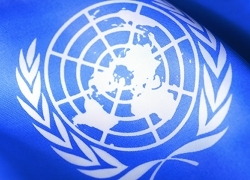Belarusian political prisoners in UN spotlight
13- 28.06.2012, 10:43

The United Nations Human Rights Council discusses two countries – Syria and Belarus – at its 20th session.
An interactive dialogue on the situation in Belarus started on Wednesday and was continued today. The UN recently had consultations on the resolution on human rights situation in Belarus, which is expected to be put to vote at the end of the session. The resolution calling to immediate and unconditional release of all political prisoners in Belarus and demanding introducing a post of a UN rapporteur has strong support among more than 20 Council member states. An anonymous source from the EU delegation says it's a high probability that the resolution will pass by a majority vote and the EU unanimously supports the proposed resolution on Belarus. Representatives of the countries concerned about the situation in Belarus mentioned the names of Belarusian prisoners of conscience Zmitser Dashkevich, Andrzej Poczobut and Ales Byalyatski, Radio Svaboda reports.
The interactive dialogue was started by UN High Commissioner for Human Rights Navi Pillay, who earlier had presented a report on Belarus. She called on the Belarusian authorities to cooperate with her Office and allow experts to visit Belarus.
She said the information for her report had been studied carefully and the situation had been analyzed. Pillay noted the report had been made in Geneva. She said her office asked permission for a technical mission to visit Belarus to meet with official representatives and the parties concerned, but no reply was received. Pillay said she regretted the situation especially taking into account criticism of her last year's oral report for having been prepared without visiting the country.
She added Belarusian Foreign Minister Martynau had invited her to visit the country, but she was told very clearly that her visit must be de-linked from her reporting obligations.
According to Pillay, the human rights situation had deteriorated following the December 2010 presidential elections, which had been followed by the campaign of massive crackdown on political opponents, human rights groups and independent media.
“The Government had tightened its control of the media and the Internet, while harassment of media workers, non-governmental organizations and human rights defenders continued,” the report says. A number of civil society groups cannot gain registration as NGOs and many human rights activists are being prosecuted on political motives, Pillay notes.
Belarus's representative Mikhail Khvostov, who took the floor after the High Commissioner, said Belarus was a democratic country and the human rights situation in the country was better than in many EU member states that criticize Belarus. Belarus said the UN High Commissioner's report was unacceptable from a legal point of view and in terms of content that the reports had nothing to do with human rights but had been prepared in a politicised context and failed to provide an accurate picture of the human rights situation in Belarus. As for the crackdown after the December 19 events, the Belarusian representative stressed only hooligans and criminals had been punished.
A representative of Russia called the report “not productive”, based on dubious sources and said it gave a biased picture of the events in Belarus and the discussion was one-sided and politicized pursuing the aims of a certain group of states. The Russian representative stressed Belarus cooperated with the Office of the High Commissioner and EU's initiatives were directed to isolation of Belarus that led the Human Right Council to a deadlock.
A representative of the EU delegation said the EU remained extremely concerned about the human rights situation in Belarus, which had significantly deteriorated since the last presidential elections were held in December 2010. The representative reminded about the second arrest of journalist Andrzej Poczobut and prosecution of human rights activists, among them Ales Byalyatski, cooperating with the UN. A representative of Germany and other EU countries also raised a question about prosecution of Belarusian journalists and human rights defenders.
The European Union delegation said the seriousness of the situation required the establishment of a Special Rapporteur on the human rights situation in Belarus.
Representatives of EU countries supported the draft resolution and the proposal for establishing a Special Rapporteur. Lithuania strongly encouraged the Human Rights Council to adopt the country-specific resolution and appoint a Special Rapporteur on the situation of human rights in Belarus.
Poland said about details of prosecution of journalist Andrzej Poczobut and noted it was only one example of numerous human rights abuses in Belarus.
A representative of the US delegation said the United States “is deeply concerned about the suppression of fundamental freedoms and human rights” in Belarus. The United States drew attention of the Council to violation of the freedom of movement, not addressed in the report by the UN High Commissioner.
The US delegation said about the necessity to create a Special Rapporteur on Belarus and expressed confidence this measure would encourage the government of Belarus to release political prisoners.
Besides Belarus and Russia, the proposal to establish a Special Rapporteur was criticized by Cuba, China and Zimbabwe.
Representatives of some countries, such as Vietnam, Azerbaijan, Iran and Venezuela, demonstrated a low-key and careful approach calling on the Belarusian authorities to cooperate with the UN in the human rights sector and on the Council to cooperate with Belarus.










